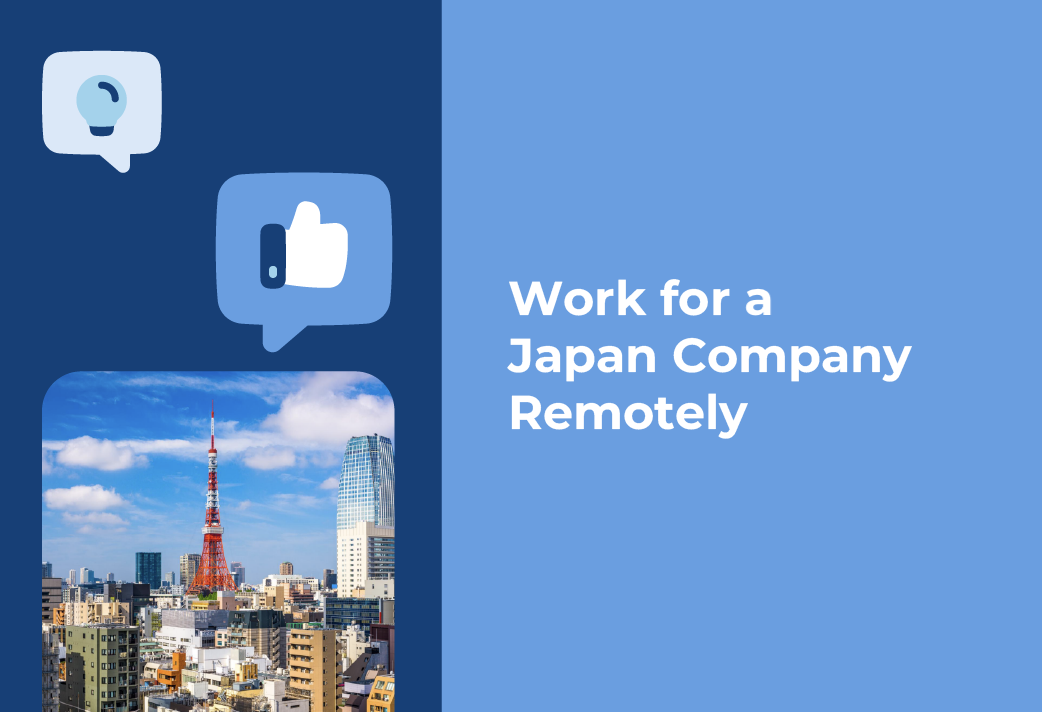Today, access to remote work has been accelerated by advancements in technology and changing attitudes towards work-life balance. If you’re considering an opportunity to work for a Japanese company remotely, there are several important factors to consider, which may require you and your hiring company to consider the options available in order to get the most out of the situation.

Tired of scrolling? Download a PDF version for easier offline reading and sharing with coworkers
Can I Work for a Japanese Company Remotely from Overseas?
In recent years, as remote work has become a more and more prevalent trend, it offers businesses and professionals the opportunity to seek new markets located in different parts of the world without the constraints of a traditional office environment. As a popular high-tech market and culturally significant destination, Japan tops the list of many aspiring and talented individuals.
In general, it is quite possible to work for a Japanese company remotely from overseas. Japan, like many other countries, has increasingly embraced remote work as a viable option for both employers and employees, meaning more and more chances abound for those willing to take the plunge. However, despite significant portions of the workforce in Japan having some experience with remote work, doing work for a Japanese company remotely from a different country adds new levels of complication.
When working for a Japanese company from overseas, it’s crucial to understand that you may be subject to different legal and tax implications depending on your country of residence.
How do Employer of Record Services Work When Considering Opportunities Outside of Japan?
Global Employer of Record (EOR) services provide a practical solution for companies looking to hire international talent without the complexities of setting up a legal entity in the employee’s country of residence.
For companies based in Japan, EOR services handle all aspects of international employment, including payroll, taxes, benefits, and compliance with local labor laws wherever talent is located.
For employees, working through an EOR offers necessary peace of mind because the steps required to be legally employed and compliant with all relevant regulations can often distract from more strategically important tasks.
By becoming the legal employer of a company’s workers, an EOR takes care of all legal and administrative tasks on the hiring company’s behalf, streamlining the process via professional expertise and allowing employees to focus on their work without worrying about compliance issues.
Can I Work Remotely for a Japanese Company Through an EOR?
Yes, you can work remotely for a Japanese company remotely through an EOR around the world. Japanese employment law allows for this arrangement, though more importantly, this will require close attention to the labor laws of the country where the employee will be based.
The EOR assumes the role of the legal employer in the worker’s country of residence, handling contract formation, payroll, taxes, benefits, and compliance with local employment laws on behalf of the company.
As the employee is then legally employed in their country of residence, this simplifies the process for both parties by eliminating the need to process administrative burdens through Japan. Otherwise, Japanese companies choosing to set up a new entity abroad and hire workers directly may find themselves managing HR admin processes in both countries at once.
How Much Does an EOR Cost?
The exact cost of using an EOR varies depending on factors such as the services provided, the employee’s salary, and the country of employment, making it impossible to specify a cost for every worker.
Typically, EOR service providers charge a monthly fee based on a percentage of the employee’s salary, taking into account the factors above. This will, therefore, leave the cost of the service ranging from 10% to 20% in most cases. However, some EORs may also charge additional fees for setup, ongoing support, or specific services.
While the costs associated with using an EOR can appear high, many companies find that the benefits quickly outweigh the expenses when compared to traditional international hiring methods as, by outsourcing employment-related tasks to an EOR, companies can save on setup time, reduce administrative burdens, and remove the chance of delays or fines due to mistakes in local regulatory compliance.
Are There Risks or Limitations to Consider When You Work for a Japanese Company Remotely?
While working remotely for a Japanese company offers numerous benefits and chances for growth, mistakes made during the transfer or setup can be devastating if not dealt with quickly. Specifically, compliance with legal and tax laws is a major issue, as both the worker and the company may have to follow rules in both Japan and the worker’s home country. This may require having a strong familiarity with double taxation agreements between Japan and your country of residence.
Communication and time zone differences may also pose significant challenges to efficiency, particularly when collaborating with colleagues or clients located in different parts of the world. It will be key to seek out new communication strategies and tools that can help bridge the gap and ensure smooth collaboration despite geographical distances.
As employment laws and regulations differ around the world, choosing to work for a Japanese company remotely will bring legal risks if the hiring company does not effectively blend current work practices with those required by local labor laws elsewhere. A big concern for those who choose to work for a Japanese company remotely as an independent contractor is misclassification of employment status. This is where a worker is hired as a freelancer to avoid employment benefit processes and costs.
Consciously or unconsciously mislabeling employees as contractors to avoid these employer responsibilities is treated very seriously in many countries, opening companies up to significant fines or penalties if caught.
Having the support of an experienced EOR can, therefore, be the difference between success or failure when business owners hire employees in many cases, as EORs not only bring effective legal forms of employment abroad but also experience and expertise in dealing with evolving international employee practices.
Go Global with World-Class EOR Services from INS Global
Since 2006, INS Global’s Employer of Record services have provided tailored solutions to companies expanding their global workforce to more than 160+ countries worldwide.
By partnering with INS Global, companies can hire and manage international talent simply and safely as we ensure compliance with local laws and regulations. We handle every facet of employment, ranging from payroll and taxation to benefits and adherence to regulations, enabling businesses of all scales to concentrate on the fundamental business goals that fuel prosperous global growth.
Understanding the legal, tax, and compliance requirements of choosing to work for a Japanese company remotely is crucial for a successful working arrangement. So, talk to an expert in global expansion today for more information on how an EOR may be the perfect choice for you.
FAQs
Can I work for a Japanese Company remotely from the US?
Yes, you can work for a Japanese company remotely while residing in the United States, with options available to be employed as a remote worker, contractor, or through an international assignment. However, in such a case, it is essential to understand the legal and tax implications for this kind of employment in both countries, as you may need to file taxes in both the US and Japan.
Compliance with labor laws in both jurisdictions is crucial. Unless your employer follows async work patterns, you may also need to be prepared to adjust your work hours to accommodate the time difference between the US and Japan and use communication tools that facilitate remote work.
Since you would be residing in the US, in this case, you won’t need a Japanese visa, but instead, you’d have to ensure that your US visa or work permit allows for this type of employment if you are not a US citizen.
Can I live in Japan and Work for a Foreign Company?
Yes, you can live in Japan and work for a foreign company remotely, with the country recently taking steps to make this easier through a digital nomad visa as of March 2024. Whether or not you make use of this specific visa, you will need to be able to live and work legally in Japan, with other options including dependent, student, spouse, investor/business manager, and working holiday visas if you aren’t a Japanese citizen.
Be aware of tax obligations in both Japan and the country where your employer is based, as Japan taxes residents on their worldwide income. Ensure you have a suitable work environment, including reliable internet access and a dedicated workspace.
You’ll also have to set up a local bank account in Japan for daily expenses and consider how you will receive your salary.
Finally, you’ll have to enroll in Japan’s National Health Insurance (NHI) or have adequate private health insurance coverage during your time in Japan.


SHARE